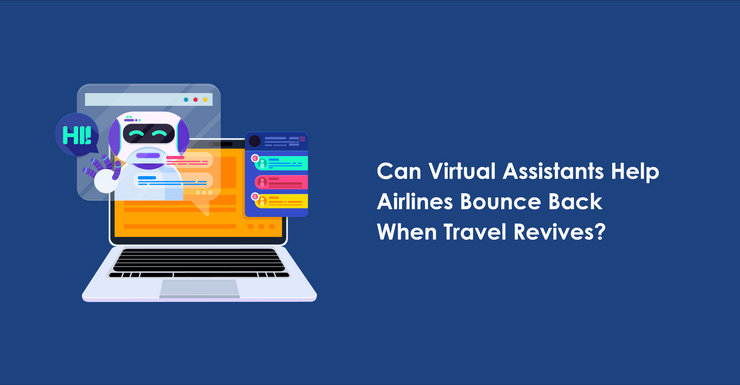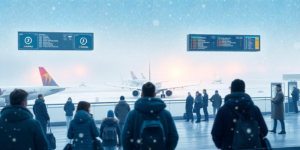According to Forbes, 86% of consumers prefer humans to chatbots.
This should not be surprising, given how many of us have reached out to customer support, hoping to get to a sympathetic human, only to be faced with a chatbot that seems determined to annoy us with either nonsensical answers or the infamous message: Sorry, I cannot help you with that.
But what if we told you that chatbots will RESCUE your AIRLINE?
That it will turn the limp that COVID-19 has given your airline’s growth into an unstoppable sprint?
Sounds unbelievable?
Allow us to show you how ARTIFICIAL INTELLIGENCE makes that possible. As you read, you will see how AI-powered customer service chatbots will not just save you money but also leave your customer delighted.
The situation to date
While chatbots with basic functionalities have been implemented by the airline sector, most of the customer support work is still being done by humans. To cut back on costs, airlines have taken to outsourcing their customer support needs, but there is a limit to the money that they can save.
Making matters worse, the COVID-19 outbreak has forced airlines to cut back on support staff. This has, to a large degree, left the airline sector vulnerable to surges in customer support requests as the pandemic subsides and travel resumes.
That raises a serious question.
How will airline support teams scale up when travel volume picks up?
Like many other sectors, the aviation industry has sought to leverage AI to enhance their passengers’ travel experience.
AI chatbots, which are self-training systems that can remember user preferences and the context of conversations to provide a human-like experience, can go a long way in enhancing customer satisfaction and bringing down costs.
Owing to its immense potential, airlines have been quick to tap into AI-powered virtual assistants/chatbots to both replace and facilitate the working of customer support executives. In many instances now, airline companies employ AI chatbots to provide customers with personalized care and flight information.
Key trends in airline chatbot implementation
Increasingly, airlines have implemented their chatbots on popular social media apps, allowing customers to get their issues resolved at their convenience. Here are a few stats that prove that the airline chatbot revolution is here to stay.
- Iceland-based carrier, Icelandair, now provides 24×7 customer support via Facebook Messenger thanks to its bot.
- Air Asia’s implementation of AVA ensures that 10 times the normal number of tickets are cleared daily.
- WestJet’s Juliet resolved 87% of the cases coming from Facebook Messenger and WhatsApp owing to its machine learning capabilities.
- During the peak of the pandemic, Iberia’s IBot resolved 72% of the incoming queries. Further, on other platforms, it had a success rate of 88% while dealing with 250,000 messages. Notably, the issues it dealt with included booking management, voucher requests, and flight status inquiries.
- The rebooking bots from KLM saved agents’ time by resolving 10% of the issues instantly and automatically and only diverting complex requests to their human counterparts.
It is beyond reasonable doubt that airline chatbots are here to stay. If the examples are not convincing, maybe the SITA report, which found 68 percent of airlines and 42% of all airports use chatbots/ virtual assistants to keep customers notified of important developments, will do the job.
Why the newfound popularity?
Given how unpopular ordinary chatbots are, it may be surprising to see AI-based bots taking over the industry. But what you are missing is that AI chatbots have a variety of features that give them an edge over all the other means of customer support that airlines have been using since the industry’s inception.
These features are what will help the industry bounce back when travel volumes go up.
- Stay on top of customer support requests regardless of volume
With AI, airlines have the option of resolving tickets extremely quickly with a limited budget even as support request volumes go through the roof. AI is tireless, so chatbots employing the technology have what it takes to scale up rapidly to meet demand. This is especially beneficial because airlines do not have to go through the tedious process of hiring and training lots of customer support executives in a short duration when travel volumes go up.
Even the ones that you do end up hiring will be more productive given how they do not have to deal with repetitive tasks all day thanks to AI-enabled automation of ticket resolution. This is a surefire way to save a ton of money.
Besides, these highly intelligent virtual agents can be used to provide quick resolutions across multiple channels, which will save you and the customers a lot of time.
- Identify and solve trending issues during flight disruptions
Even after we put the COVID-19 crisis slowly behind us, it will take time before we know its full ramifications. Consequently, new issues in travel will keep cropping up, just like the necessity for social distancing that came up amidst the worst period of the pandemic.
New challenges that may come up in the wake of the pandemic, such as government regulations or related disruptions in flight services can be found out quickly and tackled using AI. Promptly informing passengers of issues when there is a disruption in flights is a great way to prevent tickets from coming in.
- Revenue optimization through the sale of ancillaries
The fact that AI chatbots can automatically sell ancillaries through a passenger’s journey is a point in its favor. Ancillaries are a key driver of airline revenue, so the ability of chatbots to offer personalized ancillaries, such as priority boarding, seat upgrades, and extra checked baggage, answer queries instantaneously, and facilitate easier purchases justifies their use as travel picks up.
- Retain more customers with stellar customer support
Steadily, travel volumes are going up, and you can capitalize on this by consistently providing customers with a delightful travel experience. According to a study from Applied Marketing Science and Twitter, customers are willing to pay more for a flight if they have had a positive experience with the airline’s customer support team.
With an airline chatbot, you can make sure that your customers are taken care of round the clock and attended to instantly. Amazingly, you can do this without hundreds of support staff stationed around the globe.
- Safeguard your customer service executives’ mental well-being
Since a lot of customer service executives were laid off during the pandemic, the task of handling countless frustrated passengers fell on the few agents who were left. This has taken a huge toll on their mental health.
As the COVID situation gets better, support requests are set to increase drastically. With the use of AI chatbots, airlines can reduce the workload of agents by using a virtual assistant to take care of the commonly asked questions.
Conclusion
Chatbots will become ubiquitous in the aviation industry in the coming years, given the lessons from COVID-19. Further, they are much more than a cost-saving measure; airline chatbots have the potential to boost ancillary sales and bring down support costs, blurring the line between customer experience, sales, and customer support.
With chatbots/virtual assistants, airlines will also be able to retain more customers by allowing them to access instant, personalized, and easy self-service. All airline chatbots are not created equal, though. To maximize customer satisfaction and ROI, Infiniti Software Solution’s airline chatbot is the optimal solution.






